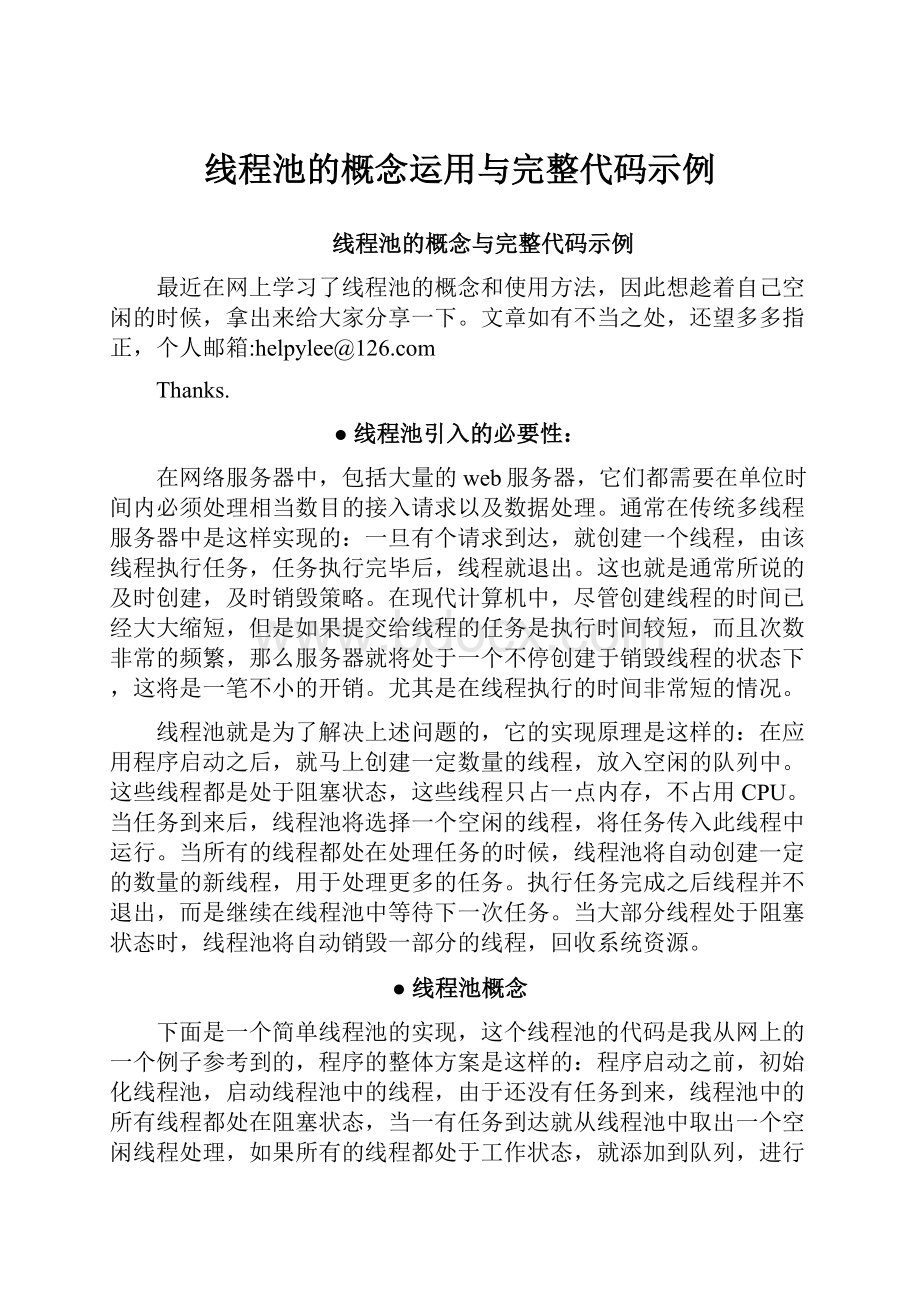线程池的概念运用与完整代码示例.docx
《线程池的概念运用与完整代码示例.docx》由会员分享,可在线阅读,更多相关《线程池的概念运用与完整代码示例.docx(15页珍藏版)》请在冰豆网上搜索。

线程池的概念运用与完整代码示例
线程池的概念与完整代码示例
最近在网上学习了线程池的概念和使用方法,因此想趁着自己空闲的时候,拿出来给大家分享一下。
文章如有不当之处,还望多多指正,个人邮箱:
helpylee@
Thanks.
●线程池引入的必要性:
在网络服务器中,包括大量的web服务器,它们都需要在单位时间内必须处理相当数目的接入请求以及数据处理。
通常在传统多线程服务器中是这样实现的:
一旦有个请求到达,就创建一个线程,由该线程执行任务,任务执行完毕后,线程就退出。
这也就是通常所说的及时创建,及时销毁策略。
在现代计算机中,尽管创建线程的时间已经大大缩短,但是如果提交给线程的任务是执行时间较短,而且次数非常的频繁,那么服务器就将处于一个不停创建于销毁线程的状态下,这将是一笔不小的开销。
尤其是在线程执行的时间非常短的情况。
线程池就是为了解决上述问题的,它的实现原理是这样的:
在应用程序启动之后,就马上创建一定数量的线程,放入空闲的队列中。
这些线程都是处于阻塞状态,这些线程只占一点内存,不占用CPU。
当任务到来后,线程池将选择一个空闲的线程,将任务传入此线程中运行。
当所有的线程都处在处理任务的时候,线程池将自动创建一定的数量的新线程,用于处理更多的任务。
执行任务完成之后线程并不退出,而是继续在线程池中等待下一次任务。
当大部分线程处于阻塞状态时,线程池将自动销毁一部分的线程,回收系统资源。
●线程池概念
下面是一个简单线程池的实现,这个线程池的代码是我从网上的一个例子参考到的,程序的整体方案是这样的:
程序启动之前,初始化线程池,启动线程池中的线程,由于还没有任务到来,线程池中的所有线程都处在阻塞状态,当一有任务到达就从线程池中取出一个空闲线程处理,如果所有的线程都处于工作状态,就添加到队列,进行排队。
如果队列中的任务个数大于队列的所能容纳的最大数量,那就不能添加任务到队列中,只能等待队列不满才能添加任务到队列中。
本程序由三个文件组成,分别是threadpoll.h,threadpoll.c,main.c,下面的代码已经在64位系统成功运行。
验证环境:
DistributorID:
Ubuntu
Description:
Ubuntu13.04
Release:
13.04
Codename:
raring
●线程池代码示例
threadpoll.h文件下的代码
#ifndef_THREADPOLL_H_
#define_THREADPOLL_H_
#include
#include
#include
#include
structjob
{
void*(*callback_function)(void*arg);//线程回调函数
void*arg;//回调函数参数
structjob*next;
};
structthreadpool
{
intthread_num;//线程池中开启线程的个数
intqueue_max_num;//队列中最大job的个数
structjob*head;//指向job的头指针
structjob*tail;//指向job的尾指针
pthread_t*pthreads;//线程池中所有线程的pthread_t
pthread_mutex_tmutex;//互斥信号量
pthread_cond_tqueue_empty;//队列为空的条件变量
pthread_cond_tqueue_not_empty;//队列不为空的条件变量
pthread_cond_tqueue_not_full;//队列不为满的条件变量
intqueue_cur_num;//队列当前的job个数
intqueue_close;//队列是否已经关闭
intpool_close;//线程池是否已经关闭
};
//===================================================================
//函数名:
threadpool_init
//函数描述:
初始化线程池
//输入:
[in]thread_num线程池开启的线程个数
//[in]queue_max_num队列的最大job个数
//输出:
无
//返回:
成功:
线程池地址失败:
NULL
//===================================================================
structthreadpool*threadpool_init(intthread_num,intqueue_max_num);
//===================================================================
//函数名:
threadpool_add_job
//函数描述:
向线程池中添加任务
//输入:
[in]pool线程池地址
//[in]callback_function回调函数
//[in]arg回调函数参数
//输出:
无
//返回:
成功:
0失败:
-1
//==================================================================
intthreadpool_add_job(structthreadpool*pool,void*(*callback_function)(void*arg),void*arg);
//===================================================================
//函数名:
threadpool_destroy
//函数描述:
销毁线程池
//输入:
[in]pool线程池地址
//输出:
无
//返回:
成功:
0失败:
-1
//===================================================================
intthreadpool_destroy(structthreadpool*pool);
//===================================================================
//函数名:
threadpool_function
//函数描述:
线程池中线程函数
//输入:
[in]arg线程池地址
//输出:
无
//返回:
无
//===================================================================
void*threadpool_function(void*arg);
#endif
threadpoll.c
#include"threadpoll.h"
#include
structthreadpool*threadpool_init(intthread_num,intqueue_max_num)
{
structthreadpool*pool=NULL;
do
{
pool=malloc(sizeof(structthreadpool));
if(NULL==pool)
{
printf("failedtomallocthreadpool!
\n");
break;
}
pool->thread_num=thread_num;
pool->queue_max_num=queue_max_num;
pool->queue_cur_num=0;
pool->head=NULL;
pool->tail=NULL;
if(pthread_mutex_init(&(pool->mutex),NULL))
{
printf("failedtoinitmutex!
\n");
break;
}
if(pthread_cond_init(&(pool->queue_empty),NULL))
{
printf("failedtoinitqueue_empty!
\n");
break;
}
if(pthread_cond_init(&(pool->queue_not_empty),NULL))
{
printf("failedtoinitqueue_not_empty!
\n");
break;
}
if(pthread_cond_init(&(pool->queue_not_full),NULL))
{
printf("failedtoinitqueue_not_full!
\n");
break;
}
pool->pthreads=malloc(sizeof(pthread_t)*thread_num);
if(NULL==pool->pthreads)
{
printf("failedtomallocpthreads!
\n");
break;
}
pool->queue_close=0;
pool->pool_close=0;
inti;
for(i=0;ithread_num;++i)
{
pthread_create(&(pool->pthreads[i]),NULL,threadpool_function,(void*)pool);
}
returnpool;
}while(0);
returnNULL;
}
intthreadpool_add_job(structthreadpool*pool,void*(*callback_function)(void*arg),void*arg)
{
assert(pool!
=NULL);
assert(callback_function!
=NULL);
assert(arg!
=NULL);
pthread_mutex_lock(&(pool->mutex));
while((pool->queue_cur_num==pool->queue_max_num)&&!
(pool->queue_close||pool->pool_close))
{
pthread_cond_wait(&(pool->queue_not_full),&(pool->mutex));//队列满的时候就等待
}
if(pool->queue_close||pool->pool_close)//队列关闭或者线程池关闭就退出
{
pthread_mutex_unlock(&(pool->mutex));
return-1;
}
structjob*pjob=(structjob*)malloc(sizeof(structjob));
if(NULL==pjob)
{
pthread_mutex_unlock(&(pool->mutex));
return-1;
}
pjob->callback_function=callback_function;
pjob->arg=arg;
pjob->next=NULL;
if(pool->head==NULL)
{
pool->head=pool->tail=pjob;
pthread_cond_broadcast(&(pool->queue_not_empty));
//队列空的时候,有任务来时就通知线程池中的线程:
队列非空
}
else
{
pool->tail->next=pjob;
pool->tail=pjob;
}
pool->queue_cur_num++;
pthread_mutex_unlock(&(pool->mutex));
return0;
}
void*threadpool_function(void*arg)
{
structthreadpool*pool=(structthreadpool*)arg;
structjob*pjob=NULL;
while
(1)//死循环
{
pthread_mutex_lock(&(pool->mutex));
while((pool->queue_cur_num==0)&&!
pool->pool_close)//队列为空时,就等待队列非空
{
pthread_cond_wait(&(pool->queue_not_empty),&(pool->mutex));
}
if(pool->pool_close)//线程池关闭,线程就退出
{
pthread_mutex_unlock(&(pool->mutex));
pthread_exit(NULL);
}
pool->queue_cur_num--;
pjob=pool->head;
if(pool->queue_cur_num==0)
{
pool->head=pool->tail=NULL;
}
else
{
pool->head=pjob->next;
}
if(pool->queue_cur_num==0)
{
pthread_cond_signal(&(pool->queue_empty));
//队列为空,就可以通知threadpool_destroy函数,销>毁线程函数
}
}
if(pool->queue_cur_num==pool->queue_max_num-1)
{
pthread_cond_broadcast(&(pool->queue_not_full));//队列非满,就可以通知threadpool_add_job函数,添>加新任务
}
pthread_mutex_unlock(&(pool->mutex));
(*(pjob->callback_function))(pjob->arg);//线程真正要做的工作,回调函数的调用
free(pjob);
pjob=NULL;
}
}
intthreadpool_destroy(structthreadpool*pool)
{
assert(pool!
=NULL);
pthread_mutex_lock(&(pool->mutex));
if(pool->queue_close||pool->pool_close)//线程池已经退出了,就直接返回
{
pthread_mutex_unlock(&(pool->mutex));
return-1;
}
pool->queue_close=1;//置队列关闭标志
while(pool->queue_cur_num!
=0)
{
pthread_cond_wait(&(pool->queue_empty),&(pool->mutex));//等待队列为空
}
pool->pool_close=1;//置线程池关闭标志
pthread_mutex_unlock(&(pool->mutex));
pthread_cond_broadcast(&(pool->queue_not_empty));//唤醒线程池中正在阻塞的线程
pthread_cond_broadcast(&(pool->queue_not_full));//唤醒添加任务的threadpool_add_job函数
inti;
for(i=0;ithread_num;++i)
{
pthread_join(pool->pthreads[i],NULL);//等待线程池的所有线程执行完毕
}
pthread_mutex_destroy(&(pool->mutex));//清理资源
pthread_cond_destroy(&(pool->queue_empty));
pthread_cond_destroy(&(pool->queue_not_empty));
pthread_cond_destroy(&(pool->queue_not_full));
free(pool->pthreads);
structjob*p;
while(pool->head!
=NULL)
{
p=pool->head;
pool->head=p->next;
free(p);
}
free(pool);
return0;
}
main.c
#include
#include"threadpoll.h"
void*work(void*arg)
{
char*p=(char*)arg;
printf("threadpoolcallbackfuction:
%s.\n",p);
sleep
(1);
}
intmain(void)
{
structthreadpool*pool=threadpool_init(10,20);
threadpool_add_job(pool,work,"1");
threadpool_add_job(pool,work,"2");
threadpool_add_job(pool,work,"3");
threadpool_add_job(pool,work,"4");
threadpool_add_job(pool,work,"5");
threadpool_add_job(pool,work,"6");
threadpool_add_job(pool,work,"7");
threadpool_add_job(pool,work,"8");
threadpool_add_job(pool,work,"9");
threadpool_add_job(pool,work,"10");
threadpool_add_job(pool,work,"11");
threadpool_add_job(pool,work,"12");
threadpool_add_job(pool,work,"13");
threadpool_add_job(pool,work,"14");
threadpool_add_job(pool,work,"15");
threadpool_add_job(pool,work,"16");
threadpool_add_job(pool,work,"17");
threadpool_add_job(pool,work,"18");
threadpool_add_job(pool,work,"19");
threadpool_add_job(pool,work,"20");
threadpool_add_job(pool,work,"21");
threadpool_add_job(pool,work,"22");
threadpool_add_job(pool,work,"23");
threadpool_add_job(pool,work,"24");
threadpool_add_job(pool,work,"25");
threadpool_add_job(pool,work,"26");
threadpool_add_job(pool,work,"27");
threadpool_add_job(pool,work,"28");
threadpool_add_job(pool,work,"29");
threadpool_add_job(pool,work,"30");
threadpool_add_job(pool,work,"31");
threadpool_add_job(pool,work,"32");
threadpool_add_job(pool,work,"33");
threadpool_add_job(pool,work,"34");
threadpool_add_job(pool,work,"35");
threadpool_add_job(pool,work,"36");
threadpool_add_job(pool,work,"37");
threadpool_add_job(pool,work,"38");
threadpool_add_job(pool,work,"39");
threadpool_add_job(pool,work,"40");
sleep(5);
threadpool_destroy(pool);
return0;
}
●运行结果
gccmain.cthreadpoll.c-lpthread-othreadpoll
./threadpoll
执行结果如下:
ky@ky-S910-X31E:
~/libz/623$./threadpoll
threadpoolcallbackfuction:
1.
threadpoolcallbackfuction:
2.
threadpoolcallbackfuction:
8.
threadpoolcallbackfuction:
5.
threadpoolcallbackfuction:
3.
threadpoolcallbackfuction:
13.
threadpoolcallbackfuction:
6.
threadpoolcallbackfuction:
17.
threadpoolcallbackfuction:
18.
threadpoolcallbackfuction:
19.
threadpoolcallbackfuction:
20.
threadpoolcallbackfuction:
21.
threadpoolcallbackfuction:
22.
threadpoolcallbackfuction:
23.
threadpoolcallbackfuction: